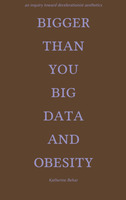Bigger Than You: Big Data and Obesity
Author(s)
Behar, Katherine
Collection
ScholarLedLanguage
EnglishAbstract
In her first inquiry toward a decelerationist aesthetics, Katherine Behar explores in this essay chapbook the rise of two “big deal” contemporary phenomena, big data and obesity. In both, scale rearticulates the human as a diffuse informational pattern, causing important shifts in political form as well as aesthetic form. Bigness redraws relationships between the singular and the collective. Understood as informational patterns, collectives can be radically inclusive, even incorporating nonhumans. As a result, the political subject is slowly becoming a new object. This social and informational body belongs to no single individual, but is shared in solidarity with something “bigger than you.” In decelerationist aesthetics, the aesthetic properties, proclivities, and performances of objects come to defy the accelerationist imperative to be nimbly individuated. Decelerationist aesthetics rejects atomistic, liberal, humanist subjects; this unit of self is too consonant with capitalist relations and functions. Instead, decelerationist aesthetics favors transhuman sociality embodied in particulate, mattered objects; the aesthetic form of such objects resists capitalist speed and immediacy by taking back and taking up space and time. In just this way, big data calls into question the conventions by which humans are defined as discrete entities, and individual scales of agency are made to form central binding pillars of social existence through which bodies are drawn into relations of power and pathos
Keywords
big data; computing; cultural studies; obesity; technologyDOI
10.21983/P3.0135.1.00ISBN
9780692652831OCN
982244908Publisher
punctum booksPublisher website
https://punctumbooks.com/Publication date and place
Brooklyn, NY, 2016Classification
Cultural studies


 Download
Download